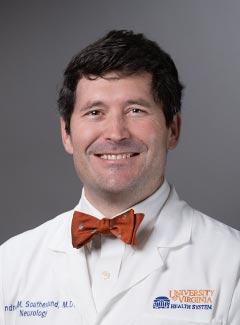
Andrew M Southerland, MD
Neurology
Bio & Overview
Academic Information
- Department
- Neurology
- Academic Role
- Professor
- Division
- Neurology
- Research Interests
- Cervical artery dissection (carotid and vertebral artery dissection), fibromuscular dysplasia, novel applications of teleneurology and telestroke, prehospital stroke care, acute stroke clinical trials
- Gender
- Male
- Languages
- English
- Age Groups Seen
- Adults (21-65)
Older Adults (65+)
- Primary Education
- The Brody School of Medicine at East Carolina University
- Residency
- University of Virginia Medical Center
- Fellowships
- University of Virginia Medical Center
- Certification
- American Board of Psychiatry and Neurology (Vascular Neurology), American Board of Psychiatry and Neurology (Neurology)
- Appointment
- Executive Vice Chair - Department of Neurology
- Additional Specialties
- Stroke
Highlights
Dr. Andrew Southerland profile video
- I am Andy Southerland. I'm an assistant professor of neurology and public health sciences in the Department in the Neurology. We treat all patients with neurological disorders. The variety but my specific focus is in and neurology and in disorders primarily related to stroke and diseases like stroke. Stroke is definitely a team sport. Acute stroke cure is a team sport for sure, which involves not only neurologists like me, but it involves emergency medicine providers. It involves nurses. We have fantastic therapists including physical, occupational, and speech and language therapists, rehabilitation physicians, and then world class nurse surgeons and interventional neurologists that help us provide high-end procedural care when that's necessary. I have a special clinical and research interest in stroke in the young and specifically a condition called cervical artery dissection that is a leading cause of stroke in the young. We do some genetics research and have a very large patient database. On a completely opposite issue, I'm very interested in telemedicine and telestroke, which is the application of stroke clinical care to remote and low-access hospitals and facilities where there's not easy availability of neurological expertise. I'm a big believer in using our technology and innovation to take ourselves out of the confines of the hospital and go out to the community where the patients need us most, and telemedicine allows us to do that.
Reviews
122 Patient Satisfaction Ratings
Our patient satisfaction ratings are an average of all the survey responses to the below questions a provider got within the past 2 years. To protect your privacy, patients aren't identified.
See more about our patient satisfaction surveys .